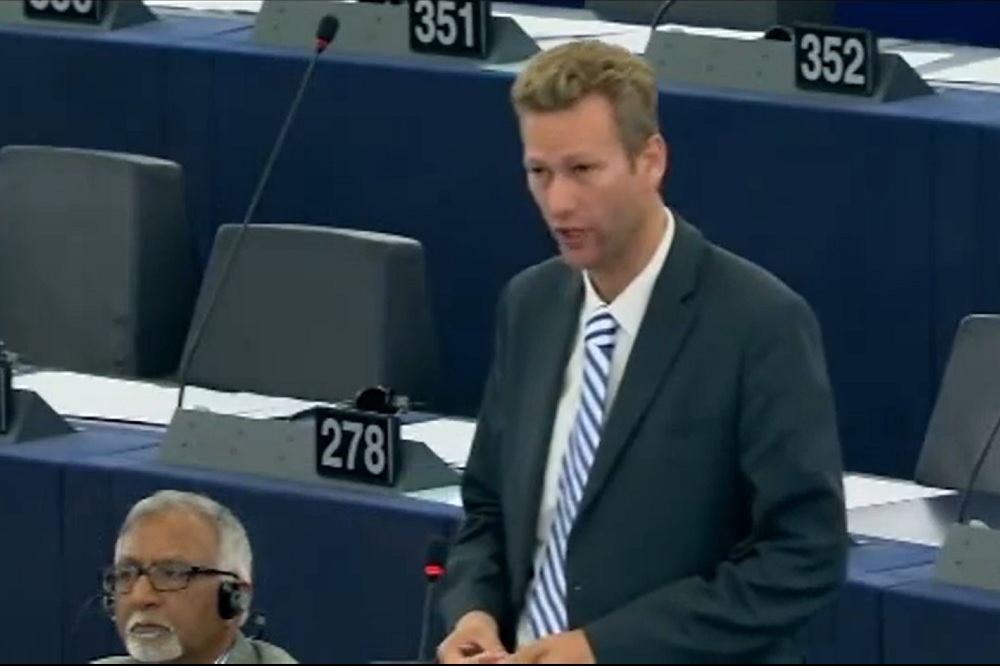Former Wales MEP and Assembly Member visited Ukraine at the invitation of sanctioned ‘pro-Kremlin’ politician

A former Wales Assembly Member and MEP, Nathan Gill, visited Ukraine at the invitation of a “pro-Kremlin” politician sanctioned over the conflict with Russia, research by Nation.Cymru has found.
Gill received travel and accommodation expenses for a trip to Kharkiv in eastern Ukraine in November 2018 to take part in a conference on “Christian values” organised by Mikhail Dobkin, a former MP and governor of Kharkiv.
Dobkin was among pro-Russian leaders hit by sanctions following the outbreak of the conflict in 2014 when Russian-backed separatists formed breakaway “republics” in two regions, Donetsk and Luhansk, while Crimea was illegally annexed by Russia.
The European Council on Foreign Relations described him as “explicitly pro-Kremlin”, although he wrote on Facebook earlier this month that “much of what I believed in collapsed overnight” following the invasion of Ukraine.
European Parliament records show Gill’s travel and hotel expenses were paid by the charitable foundation of Dobkin’s brother, Dmytro, who has been investigated over vote buying.
The visit came after Gill, who was one of Wales’ four MEPs between 2014 and 2020, had invited Dobkin to take part in a conference on Christianity at the European Parliament earlier in 2018.
Subsequently, Dobkin sent a letter to Gill which said: “I avail myself of this opportunity to express my deep gratitude for this kind invitation to speak at the European Parliament. It was fascinating and thought-provoking to discover how common are challenges that Christian churches and believers encounter all over Europe.
“Your timely initiative inspired me to hold a similar initiative in Ukraine. I am honoured to invite you to become a key-note speaker at the conference. Hope to see you in Ukraine soon to coordinate our efforts in the world full of growing challenges to the fundamental values we share.”
‘Repression’
Gill took a keen interest in Ukraine from the moment he was elected to the European Parliament until Brexit.
In his maiden speech in September 2014, he warned an association agreement between Ukraine and the EU could lead to war, saying: “The Ukraine is a buffer zone between NATO and Russia; the EU has taken away this buffer zone, potentially putting NATO tanks on the border with Russia. What you are doing today is throwing petrol onto the bonfire which the EU lit.
“Putin is not the biggest threat to our civilisation. The biggest threat is Muslim extremists.”
In December 2018, a month after his visit to Dobkin’s conference, Gill raised the issue of two pro-Kremlin TV stations, 112 Ukraine and News One, which the Ukrainian parliament voted to close to counter “Russian propaganda.”
He said “we all stand by Ukraine and we support its sovereignty and its territorial integrity” and added: “I have every sympathy with Ukraine when it comes to Crimea, when it comes to Russian aggression and interference.”
But he went on to say: “But as surely as you can’t fight fire with fire, it is wrong to fight repression with repression. We’ve seen activists and journalists alike being violently attacked by radicals, with little if any reaction or protection from the Ukrainian Government.”
Gill subsequently became a board member of both TV stations, according to the European Parliament’s register of interests, and raised the issue again in October 2019.
In 2019, Gill also tweeted an article from 112 Ukraine saying: “Today is the 1031st anniversary of the Christianization of Ukraine.”
That anniversary, the baptism of the prince of Kyiv in 988, has been cited by Putin as the reason for the annexation of Crimea and also more recently in a 5,000-word essay claiming that Russians and Ukrainians are “one people”.
‘Kremlin line’
In his penultimate speech in the European Parliament before Brexit, Gill said: “Every dictatorship and repressive regime immediately seeks to close down the freedom of the press and media, thinking foolishly that they can silence opposition.
“Ukraine’s previous President, Petro Poroshenko, tried, using legal process, to silence media that did not act as his mouthpiece. This was condemned and it failed. Ukraine has a new President, Volodymyr Zelensky, who is following the same old tired pattern.”
Wales’ Counsel General and Constitution Minister Mick Antinow wrote at the time that it was “interesting that Nathan Gill is so keen to support this TV channel which is widely believed in Ukraine to be a pro Putin Russian propaganda front.”
Gary Cartwright, the editor of the EU Today website, wrote: “Whether unwittingly or otherwise, Gill is consistently echoing the Kremlin line precisely.
“Lobbyists from these channels – often posing as journalists or human rights activists – are known to be operating in Brussels trying to find support from European politicians claiming violations of freedom of speech and media persecution in Ukraine. It appears they are finding their targets.”
Nathan Gill has not commented publicly on the invasion of Ukraine. Nation.Cymru contacted him but received no response.
As well as being an MEP, Gill was also a UKIP member of the Senedd between May 2016 and December 2017 before quitting amid infighting over the leadership of the party in Wales.
He joined Nigel Farage’s Brexit party and was re-elected as an MEP in 2019. After Brexit, the party was rebranded as Reform UK. Gill was its lead candidate on the North Wales list but was not elected amid a wipeout for devosceptic parties.
Nation.Cymru revealed yesterday how Nathan Gill had stepped down as Reform UK’s leader in Wales following last year’s Senedd election.
Support our Nation today
For the price of a cup of coffee a month you can help us create an independent, not-for-profit, national news service for the people of Wales, by the people of Wales.





